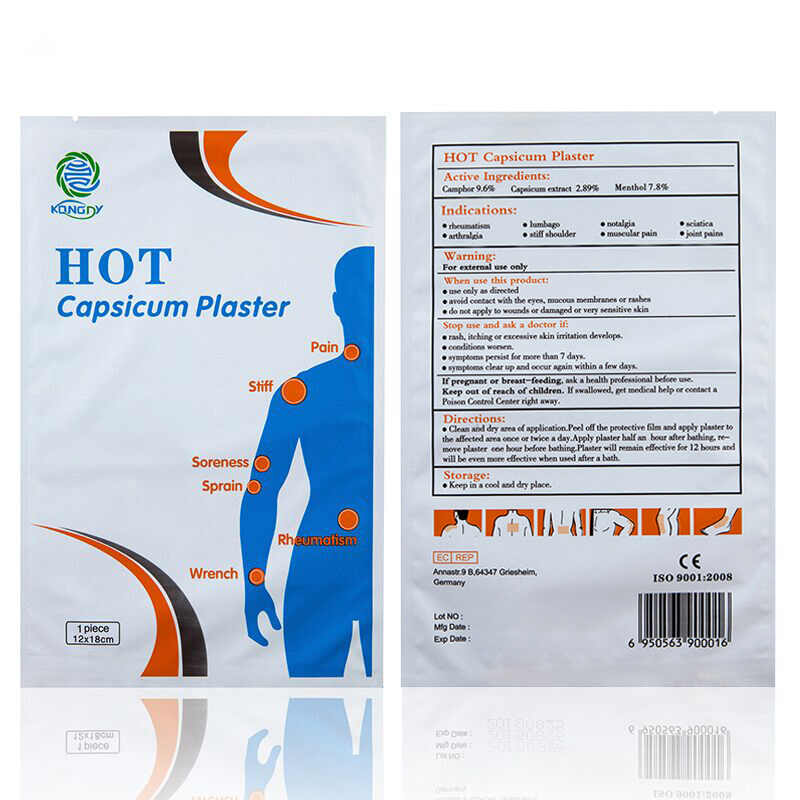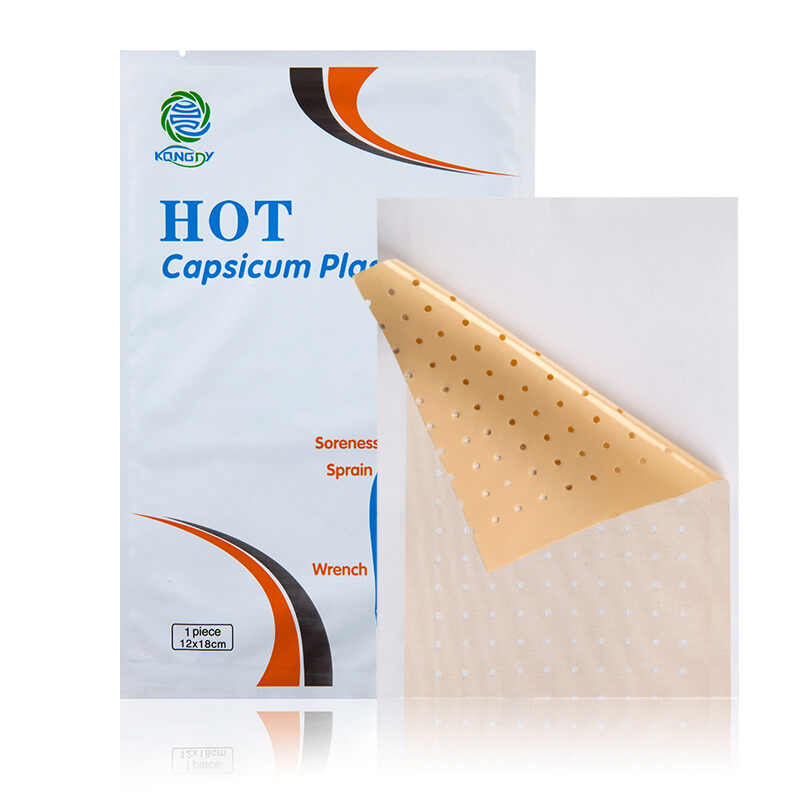What Certifications Should I Look for in a Herbal Capsicum Patches Supplier?
Ensuring Compliance, Quality, and Market Readiness with the Right OEM and Manufacturing Standards
Introduction
In today’s competitive wellness market, Herbal Capsicum Patches have emerged as a go-to solution for natural pain relief. Whether you’re building a new health brand or expanding your product line, working with a certified and compliant Herbal Capsicum Patches Supplier is not just a smart move — it's a necessity.
Certifications are more than formalities; they are powerful indicators of product safety, quality assurance, regulatory compliance, and manufacturing integrity. For businesses sourcing Private Label Herbal Capsicum Patches or developing Custom Herbal Capsicum Patches, understanding these certifications is crucial in avoiding legal complications, failed product registrations, and customer complaints.
In this article, we’ll break down the key certifications every reputable Herbal Capsicum Patches Manufacturer should possess, how these affect product quality and market access, and what to request during supplier vetting.

1. Why Certifications Matter in the Herbal Capsicum Patch Industry
Certifications validate that a Herbal Capsicum Patches OEM follows good manufacturing practices, uses safe ingredients, and produces consistent, legally compliant products.
For buyers and brands, certifications:
Reduce regulatory risk
Improve consumer confidence
Enable international export
Guarantee safety and performance
Strengthen brand positioning
Working with a certified Herbal Capsicum Patches Supplier helps you stand out in regulated and competitive markets like the USA, EU, Australia, and the Middle East.
2. Essential Certifications to Look for
a. GMP (Good Manufacturing Practice)
Why it matters:
GMP is the most fundamental quality standard for any Herbal Capsicum Patches Manufacturer. It ensures that products are consistently produced and controlled according to strict quality standards.
What it covers:
Hygiene and facility standards
Employee training
Batch consistency
Contamination control
Documentation and traceability
GMP-certified Herbal Capsicum Patches OEM facilities ensure that every patch meets the same high-quality standard.
✅ Must-have for both Private Label and Custom Herbal Capsicum Patches.
b. ISO 13485: Quality Management System for Medical Devices
Why it matters:
ISO 13485 is crucial if your Herbal Capsicum Patches are classified as medical devices in your target markets.
What it covers:
Risk management procedures
Regulatory compliance
Quality documentation
Ongoing monitoring and audits
If you're working with a Custom Herbal Capsicum Patches OEM provider that develops therapeutic patches, this certification demonstrates medical-grade manufacturing capabilities.
c. FDA Registration (USA)
Why it matters:
If you're selling in the U.S., the Herbal Capsicum Patches Manufacturer must be FDA-registered, especially if the patch is marketed as a drug or medical device.
What it covers:
Facility registration with the FDA
Compliance with OTC monograph or New Drug Application (NDA)
Labeling and marketing compliance
FDA registration improves transparency and enables legal import/export into the U.S. wellness and healthcare market.
d. CE Mark (Europe)
Why it matters:
For sales in the European Economic Area (EEA), Herbal Capsicum Patches OEM suppliers must meet CE requirements.
What it covers:
Product safety
Performance and efficacy
Clinical evaluation (if applicable)
Labeling and documentation
CE-marked Private Label Herbal Capsicum Patches can legally be distributed across EU countries and are seen as high-quality by global consumers.
e. MSDS (Material Safety Data Sheet)
Why it matters:
This document outlines the chemical composition and safety handling procedures for your patches.
What it includes:
Ingredient breakdown
Potential health hazards
Safe storage and disposal
First aid measures
A transparent Herbal Capsicum Patches Supplier will always provide MSDS for every formula, especially for Custom Herbal Capsicum Patches.
f. Dermatological Testing & Hypoallergenic Certification
Why it matters:
Skin irritation is a key concern with capsaicin patches. Dermatological testing ensures that products are safe for most skin types.
Provided by:
Independent dermatology labs
Clinical testing organizations
Especially important for Custom Herbal Capsicum Patches developed for sensitive skin or targeted demographics (elderly, women, athletes).
g. Halal / Vegan / Organic Certifications
Why it matters:
Consumer segments are increasingly interested in ethical and sustainable products. Certifications like:
Halal (for Muslim markets)
Vegan (no animal products or testing)
USDA Organic / ECOCERT (certified natural ingredients)
These are valuable differentiators, especially for Private Label Herbal Capsicum Patches in niche or value-driven markets.
3. Red Flags: What to Avoid in a Herbal Capsicum Patches Supplier
Even if a supplier claims to offer high-quality products, lack of documentation or third-party certification should be a warning sign. Watch out for:
No GMP/ISO documentation
Missing MSDS or COA (Certificate of Analysis)
Vague responses about FDA/CE compliance
No batch testing or stability data
Unwillingness to share factory audit reports
A reliable Herbal Capsicum Patches Manufacturer will be transparent, cooperative, and ready to share compliance proof.
4. Certifications and Private Label vs. Custom Products
| Certification | Private Label Herbal Capsicum Patches | Custom Herbal Capsicum Patches |
|---|---|---|
| GMP | Required | Required |
| ISO 13485 | Optional (recommended for medical claims) | Strongly recommended |
| FDA Registration | Highly recommended | Mandatory if selling in USA |
| CE Certification | Important for EU market | Mandatory for EU if classified as medical |
| Dermatological Test | Optional | Recommended for sensitive skin products |
| MSDS | Required | Required |
| Halal/Vegan/Organic | Optional (depends on market) | Optional (adds market value) |
5. Questions to Ask Your Herbal Capsicum Patches OEM or Supplier
When evaluating a potential partner, ask these questions to verify certification and quality assurance:
Are you GMP- and ISO-certified?
Can you provide FDA or CE registration for your facilities and products?
Do you offer MSDS, COA, and dermatological test results?
Do you conduct third-party lab testing?
What regulatory markets are your Herbal Capsicum Patches approved for?
Can you customize formulations to meet international standards?
Getting clear answers helps avoid non-compliance, product recalls, and consumer dissatisfaction.
6. Real-World Case Study
A wellness brand from Germany partnered with a Herbal Capsicum Patches OEM in Asia to launch a line of Private Label Herbal Capsicum Patches for arthritis relief. Their first shipment was delayed at customs due to missing CE certification. After switching to a Herbal Capsicum Patches Manufacturer with full ISO, CE, and MSDS documentation, they successfully entered the market and now distribute in over 15 European countries.
Lesson: Certifications aren’t optional—they are the foundation for smooth operations and long-term growth.
7. The Future of Compliance in the Herbal Capsicum Patch Industry
As regulations tighten globally, certifications will only grow in importance. In 2025 and beyond, leading Herbal Capsicum Patches Suppliers are expected to:
Invest in eco-labels and sustainability certifications
Adopt AI-driven quality assurance systems
Offer blockchain-based traceability for ingredients
Brands that align with compliant and transparent partners will not only meet legal standards but also build deeper trust with consumers.
Conclusion
Choosing the right Herbal Capsicum Patches Supplier isn’t just about price or speed—it’s about compliance, transparency, and trust. Whether you’re launching a Private Label Herbal Capsicum Patches brand or developing Custom Herbal Capsicum Patches, insist on certifications like GMP, ISO 13485, FDA, CE, and MSDS as non-negotiables.
A certified Herbal Capsicum Patches Manufacturer doesn’t just ensure quality — they protect your brand, reputation, and bottom line.
Related Questions and Brief Answers
1. What’s the most important certification for a Herbal Capsicum Patches Supplier?
GMP is essential for manufacturing safety and consistency. ISO 13485 is also key for medical-grade products.
2. Can I sell Herbal Capsicum Patches in the USA without FDA registration?
No. FDA registration is necessary if the product is classified as a medical device or drug.
3. Are CE-marked patches required in the EU?
Yes, for any product marketed with therapeutic claims in the EU.
4. Is dermatological testing mandatory?
Not mandatory, but strongly recommended, especially for sensitive-skin applications or niche markets.
5. What certifications add market value in niche segments?
Vegan, Halal, and Organic certifications enhance trust in ethical or faith-based markets.
6. How can I verify a supplier’s certifications?
Request official documents and verify with issuing bodies if needed. A reliable Herbal Capsicum Patches OEM will always cooperate.






